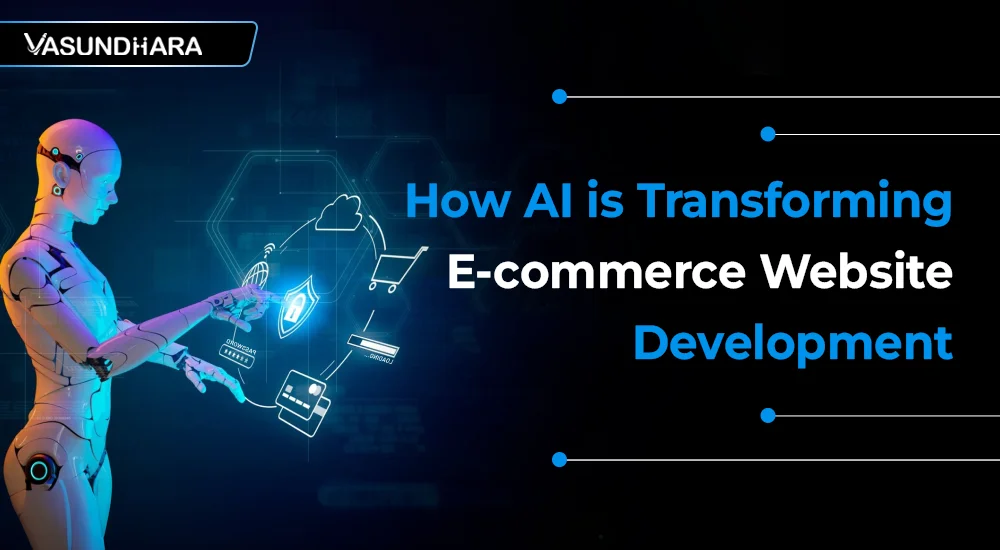How AI is Transforming E-commerce Website Development


- May 31, 2024



The concept of artificial intelligence (AI) has recently gained widespread attention and is now ubiquitous, transcending the realm of frightening futuristic films. It is unsettling to consider its impact on the employment market, the integrity of news on social media, and humanity's ultimate survival in the face of it.
One thing that is certain and something to be proud of is that e-commerce has been an early adopter in implementing and demonstrating AI solutions to enhance online customer satisfaction.
AI simplifies the e-commerce website process by utilizing collected consumer behavior data from multiple touchpoints to identify the specific products that shoppers desire, make the appropriate merchandising decisions, implement the appropriate optimization, and ultimately deliver a satisfactory user experience.
As a custom website development company, we at Vasundhara Infotech specialize in all aspects of the latest technologies. Keep reading this blog to know the ways how AI is transforming e-commerce customer experience.
Numerous studies indicate that not many eCommerce businesses are utilizing AI at the moment. 83% of businesses claim that AI is a major priority in their company goals, thus it is anticipated that this number will soar over the next several years.
The increased awareness of AI's potential advantages, the decreasing cost of hardware with AI capabilities, and the expanding availability of AI services are all contributing to the technology's rapid adoption. We may anticipate even more revolutionary shifts in the eCommerce sector as more businesses start to use AI.
Alibaba, eBay, and Amazon are a few major e-commerce companies that use AI.
AI technology is currently being implemented in the context of e-commerce platforms to:
Analyze and observe customer interactions and purchasing patterns with precision, and then apply this knowledge to inform strategy.
Customize online purchasing experiences to captivate and impress customers
Generative AI automates the creation of unique product descriptions, generates targeted marketing content, and powers AI chatbots for 24/7 customer support.
Create personalized product recommendations that are so alluring that individuals are unable to resist reaching for their credit cards.
Increase the value of orders by upselling and cross-selling desirable items during the transaction process.
Offer exceptional customer service through chatbots, eliminating the necessity for customers to wait on hold.
Achieve such success in all of the aforementioned that customers are eager to return for more, thereby increasing customer retention.
Boost the success of an ecommerce site by enhancing conversions, ROI, brand awareness, and all other essential factors throughout the virtual realm.
Also read: How Much Does An E-commerce Website Cost In 2024
Here are a few ways artificial intelligence has demonstrated its power in the realm of ecommerce website development.
Profits increase when you can find the pricing optimization sweet spot with accuracy and consistency. And, with AI-powered software and the ability to analyze massive datasets, hitting that moving target becomes much easier. AI-enabled dynamic pricing allows you to adjust rates based on supply and demand.
For example, if a competitor's site is running out on an item, you can be notified and adjust your prices accordingly.
AI-related innovations in natural language processing (NLP), which focuses on how computers comprehend human language, have resulted in significant improvements in search engine performance. Based on AI's understanding of the query a shopper is inputting or uttering, NLP allows you to more accurately determine what they're looking for and proactively deliver the search results they desire.
Additional AI-facilitated approaches include the addition of synonyms and missing words or phrases, as well as the automatic correction of spelling problems.
AI also makes it easier to enter client inquiries for those who prefer to speak or provide visuals. Visual search uses AI techniques to process an image, such as a photo of an item spotted on the street, and then propose comparable goods.
A personalized buying experience is king in e-commerce. "Personalization, supported by data and analytics, is a powerful tool to strengthen the connection to the brand, win consumer loyalty, and draw customers into stores," according to a report by McKinsey for 2021 The organization also discovered that the majority of customers demand individualized purchasing experiences. However, only 15% of retailers had implemented personalization across all of their channels.
E-commerce customisation has long been a popular item, but artificial intelligence has taken it to new heights. Computers using AI can acquire and evaluate massive volumes of client data and deliver intelligent real-time analytics, allowing websites to function as trustworthy advisers, recommending the proper things and offering appealing discounts.
Recommendations are a unique component of customization. E-commerce customization in an online business goes well beyond what customers can expect to see in a physical store. AI algorithms can collect relevant insights about shoppers, such as how they browsed and their purchase history, allowing for accurate prediction of what they desire and suggestion of the appropriate item or related products. When a recommendation engine is accurate, a purchase is likely.
Also read: 10 Reasons Why You Should Have An Ecommerce Website
Which things are your customers likely to add to their carts while they are happily checking out?
Product suggestion technology is yet another ecommerce product that has been upgraded using artificial intelligence. You can use frequently collected data generated by collaborative filtering to inform your response.
When it comes to providing exceptional customer service, chatbots and other virtual assistants shine as online help representatives. AI is definitely engaged in almost all aspects of a chatbot. Their functionality can use natural language processing (NLP) to help them determine shoppers' wants, and with the use of machine learning solutions, they can increase their expertise over time to become increasingly smarter digital butlers.
Chatbots have already proven beneficial to both ecommerce companies and customers. They are available 24/7 for late-night shoppers, don't require coffee breaks, maintain a polite demeanor, provide answers to common questions, and free up live agents to handle more complex issues. However, as AI technology progresses, chatbots' abilities get more polished, causing users to warm up to them even more.
AI technology employs predictive analysis that is far more complex than that attained by referring to current stock levels and keeping a close check on your supply chain. Machine learning allows a corporation to precisely predict how much inventory to order and how much to keep on hand. McKinsey adds that this level of foresight can significantly reduce lost sales when inventory is out of supply.
AI has the potential to streamline warehouse management by allowing bots to handle the onerous task of storing and retrieving stored things.
Statista estimates that online fraudulent activities would cost e-commerce firms $20 billion globally in 2021. The good news is that AI has some advanced solutions to this challenge. Previously, armies of employees would methodically scrutinize transactions for abnormalities. It's fascinating how machine-learning algorithms can detect fraud by analyzing millions of big data points and instantaneously identifying questionable activity.
For example, a criminal attempting to make a fraudulent transaction may input an inaccurate shipping address, which a human would never detect or respond to, much less in the time that an algorithm might flag it.
AI is also being used to solve another integrity-related e-commerce website development: people leaving bogus reviews.
Did you aware that abandoned shopping carts significantly reduce conversion rates? AI can help you boost your conversion rates and reduce customer churn by allowing you to follow up when potential consumers leave the site with things remaining in their cart. AI accomplishes this by gathering information about visitors and, when they leave the site empty-handed, contacting them, such as via email, to remind them of the things in their basket.
Aside from influencing what happens at the technological level in an ecommerce store, like in other industries, AI can handle mundane daily activities and reduce personnel headcount. The situation of human shop associates being replaced by bots and automation is unfortunate, but when it comes to the bottom line, few organizations disagree that AI is the superior choice.
It's always tempting to dive headfirst into cutting-edge technology. However, before launching a new initiative, you should have a plan in place to avoid wasting time and money on misguided endeavors.
Develop a strategy: You have to start somewhere, and your plan will outline the steps you must follow to reach your AI goal. Don't simply delegate this to a recently hired AI expert, your CIO, or CTO.
Consider what you want to accomplish with AI. Take a practical attitude, and remember to start small. You may always expand on your triumphs in the future.
Identify focused use cases that are related to the larger corporate goal: The most successful AI use cases combine corporate objectives, data differentiation, and widely available artificial intelligence models.
All of this indicates that you should concentrate on revenue-generating possibilities where you have a data edge and in an environment suitable for established AI technology.
Utilize third-party knowledge: Even if you're an armchair AI specialist, you'll want to get professional guidance on this one. Hire a tiger team on a project or part-time basis to help you develop a comprehensive AI plan. Third parties can also help bring your MVP (minimum viable product) to reality.
Create a full-scale solution: Once you're satisfied with what your team has created, it's time to build a full-scale solution. Don't be surprised if it takes a few attempts to work as expected. As you and your team gain confidence in working with AI, the initiatives you execute will begin to yield more benefits.
While AI of the future may sound like something out of a movie, there is already a lot of AI technology in use today that enhances customer experience, boosts conversion rates, and simplifies corporate operations.
Examine the many advantages of AI and machine learning if you want to provide the greatest possible shopping experience on your e-commerce website. It can assist you in developing a successful plan for the future by enabling you to make greater use of your consumer and business data.
Are you ready to advance your e-commerce business? For a free consultation and to learn how our expert team can help you realize your vision while staying within your budget, get in touch with us right now.
We can help you succeed in the digital market and enhance your online presence, regardless of how big or small your business is. Together, let's create something truly amazing.
Copyright © 2026 Vasundhara Infotech. All Rights Reserved.